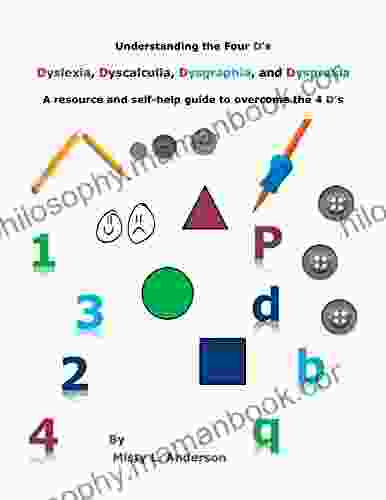Dyslexia, Dyscalculia, Dysgraphia, and Dyspraxia: Understanding Learning Differences

5 out of 5
| Language | : | English |
| File size | : | 606 KB |
| Text-to-Speech | : | Enabled |
| Screen Reader | : | Supported |
| Enhanced typesetting | : | Enabled |
| Word Wise | : | Enabled |
| Print length | : | 142 pages |
| Lending | : | Enabled |
Learning disabilities are neurodevelopmental disorders that affect a person's ability to learn and process information in the same way as others. They can manifest in various areas, including reading, writing, mathematics, and coordination. Among the most common learning disabilities are dyslexia, dyscalculia, dysgraphia, and dyspraxia.
Dyslexia
Definition
Dyslexia is a specific learning disability that affects an individual's ability to read, write, and spell. It is characterized by difficulties with phonological processing, the ability to manipulate sounds in words.
Symptoms
Symptoms of dyslexia can include:
- Difficulty decoding words
- Slow and inaccurate reading
- Poor spelling
- Difficulty with phonics
- Confusion with letters and words that look or sound similar
Causes
Dyslexia is believed to be caused by a combination of genetic and environmental factors. It is thought to be related to differences in the way the brain processes language and sounds.
Diagnosis
Dyslexia is diagnosed through a comprehensive evaluation that typically includes:
- Assessment of reading, writing, and spelling skills
- Phonological processing tests
- Intelligence testing
Support
There is no cure for dyslexia, but with appropriate support, individuals can learn to manage their difficulties. Support measures may include:
- Specialized reading instruction
- Phonics-based interventions
- Assistive technology (e.g., text-to-speech software)
- Accommodations in school (e.g., extra time on tests, assistive devices)
Dyscalculia
Definition
Dyscalculia is a specific learning disability that affects an individual's ability to understand and use numbers and mathematical concepts.
Symptoms
Symptoms of dyscalculia can include:
- Difficulty understanding number concepts
- Trouble with basic arithmetic operations (e.g., addition, subtraction)
- Poor number sense
- Difficulty with time and money
- Confusion with mathematical symbols and operations
Causes
Dyscalculia is believed to be caused by a combination of genetic and environmental factors. It is thought to be related to differences in the way the brain processes numerical information.
Diagnosis
Dyscalculia is diagnosed through a comprehensive evaluation that typically includes:
- Assessment of mathematical skills and concepts
- Cognitive testing
- Intelligence testing
Support
There is no cure for dyscalculia, but with appropriate support, individuals can learn to manage their difficulties. Support measures may include:
- Specialized mathematics instruction
- Use of manipulatives (e.g., blocks, counters)
- Visual aids and graphic organizers
- Accommodations in school (e.g., extra time on tests, use of calculators)
Dysgraphia
Definition
Dysgraphia is a specific learning disability that affects an individual's ability to write, including handwriting, spelling, and composition.
Symptoms
Symptoms of dysgraphia can include:
- Poor handwriting
- Difficulty forming letters and words
- Poor spelling
- Difficulty organizing writing
- Avoidance of writing tasks
Causes
Dysgraphia is believed to be caused by a combination of genetic and environmental factors. It is thought to be related to differences in the way the brain processes motor skills and language.
Diagnosis
Dysgraphia is diagnosed through a comprehensive evaluation that typically includes:
- Assessment of handwriting, spelling, and composition skills
- Motor skills evaluation
- Intelligence testing
Support
There is no cure for dysgraphia, but with appropriate support, individuals can learn to manage their difficulties. Support measures may include:
- Specialized handwriting instruction
- Use of assistive technology (e.g., speech-to-text software, word processors with spell-check)
- Accommodations in school (e.g., extra time on writing assignments, use of computers)
Dyspraxia
Definition
Dyspraxia is a specific learning disability that affects an individual's ability to plan and execute coordinated movements. It can range from mild to severe and may affect fine motor skills (e.g., writing, buttoning),gross motor skills (e.g., walking, running),or both.
Symptoms
Symptoms of dyspraxia can include:
- Difficulty with fine motor skills (e.g., writing, drawing, using scissors)
- Difficulty with gross motor skills (e.g., walking, running, playing sports)
- Poor coordination
- Difficulty with balance and posture
- Clumsiness and frequent accidents
Causes
Dyspraxia is believed to be caused by a combination of genetic and environmental factors. It is thought to be related to differences in the way the brain plans and executes movement.
Diagnosis
Dyspraxia is diagnosed through a comprehensive evaluation that typically includes:
- Assessment of motor skills
- Observation of behavior
- Consultation with other professionals (e.g., occupational therapist, physical therapist)
Support
There is no cure for dyspraxia, but with appropriate support, individuals can learn to manage their difficulties. Support
5 out of 5
| Language | : | English |
| File size | : | 606 KB |
| Text-to-Speech | : | Enabled |
| Screen Reader | : | Supported |
| Enhanced typesetting | : | Enabled |
| Word Wise | : | Enabled |
| Print length | : | 142 pages |
| Lending | : | Enabled |
Do you want to contribute by writing guest posts on this blog?
Please contact us and send us a resume of previous articles that you have written.
 Top Book
Top Book Novel
Novel Fiction
Fiction Nonfiction
Nonfiction Literature
Literature Paperback
Paperback Hardcover
Hardcover E-book
E-book Audiobook
Audiobook Bestseller
Bestseller Classic
Classic Mystery
Mystery Thriller
Thriller Romance
Romance Fantasy
Fantasy Science Fiction
Science Fiction Biography
Biography Memoir
Memoir Autobiography
Autobiography Poetry
Poetry Drama
Drama Historical Fiction
Historical Fiction Self-help
Self-help Young Adult
Young Adult Childrens Books
Childrens Books Graphic Novel
Graphic Novel Anthology
Anthology Series
Series Encyclopedia
Encyclopedia Reference
Reference Guidebook
Guidebook Textbook
Textbook Workbook
Workbook Journal
Journal Diary
Diary Manuscript
Manuscript Folio
Folio Pulp Fiction
Pulp Fiction Short Stories
Short Stories Fairy Tales
Fairy Tales Fables
Fables Mythology
Mythology Philosophy
Philosophy Religion
Religion Spirituality
Spirituality Essays
Essays Critique
Critique Commentary
Commentary Glossary
Glossary Bibliography
Bibliography Index
Index Table of Contents
Table of Contents Preface
Preface Introduction
Introduction Foreword
Foreword Afterword
Afterword Appendices
Appendices Annotations
Annotations Footnotes
Footnotes Epilogue
Epilogue Prologue
Prologue Mitsutoshi Shimabukuro
Mitsutoshi Shimabukuro Elaine Thorp
Elaine Thorp Ian Bremmer
Ian Bremmer Alberto Herrera Jefferson
Alberto Herrera Jefferson Melanie Moreland
Melanie Moreland Elie Mystal
Elie Mystal Nick Dubin
Nick Dubin J P Valentine
J P Valentine Flavio Augusto
Flavio Augusto Megan Febuary
Megan Febuary Marie Orwell
Marie Orwell M Lennon Perricone
M Lennon Perricone Rawlin Cash
Rawlin Cash Carter Anderson
Carter Anderson Josh Holt
Josh Holt Mark Williams
Mark Williams Coreen Sears
Coreen Sears Dominic Barton
Dominic Barton J Forster
J Forster William Bortz
William Bortz
Light bulbAdvertise smarter! Our strategic ad space ensures maximum exposure. Reserve your spot today!

 Mason PowellEndpoint and Other Poems by John Updike: A Journey Through Mortality, Memory,...
Mason PowellEndpoint and Other Poems by John Updike: A Journey Through Mortality, Memory,... Jaime MitchellFollow ·6.4k
Jaime MitchellFollow ·6.4k Benji PowellFollow ·13.8k
Benji PowellFollow ·13.8k Roy BellFollow ·14.5k
Roy BellFollow ·14.5k Edwin BlairFollow ·4.3k
Edwin BlairFollow ·4.3k Thomas PynchonFollow ·7.1k
Thomas PynchonFollow ·7.1k Max TurnerFollow ·5.1k
Max TurnerFollow ·5.1k Jason HayesFollow ·11.6k
Jason HayesFollow ·11.6k Tyler NelsonFollow ·18.7k
Tyler NelsonFollow ·18.7k

 Ignacio Hayes
Ignacio HayesShipwrecked For 13 Days On Coral Reef: A Tale of Survival...
In the vast expanse of the...

 Gerald Parker
Gerald ParkerWhere the World Is Quiet: Delving into a Realm of Serene...
A Tapestry of Serenity In the tapestry...

 Charles Bukowski
Charles BukowskiPloughshares Winter 2009: Guest Edited by Tony Hoagland
Ploughshares...

 Rubén Darío
Rubén DaríoAnthology of Massachusetts Poets: William Stanley...
William Stanley...

 Jason Hayes
Jason HayesSean Kenney's Mesmerizing Robot Masterpieces: A Journey...
In a realm where imagination meets...

 Terence Nelson
Terence NelsonUnveiling the Elite Force: The Commander Men of Hidden...
In the shadows of society, where justice...
5 out of 5
| Language | : | English |
| File size | : | 606 KB |
| Text-to-Speech | : | Enabled |
| Screen Reader | : | Supported |
| Enhanced typesetting | : | Enabled |
| Word Wise | : | Enabled |
| Print length | : | 142 pages |
| Lending | : | Enabled |










